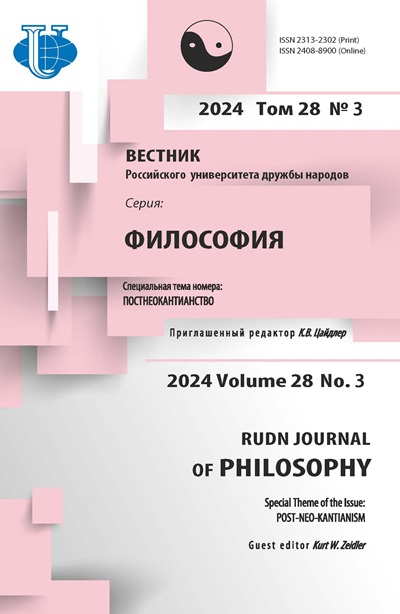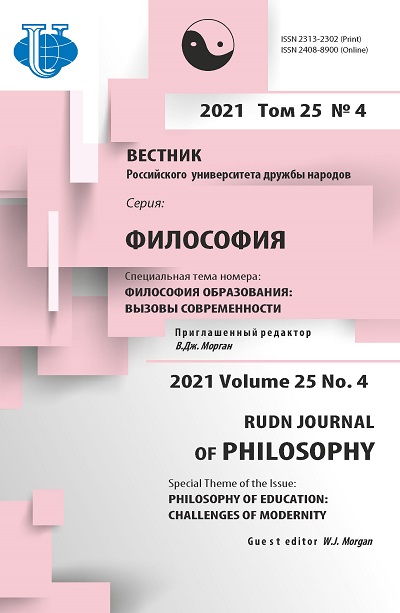Духовные упражнения как techne: философия как способ освобождения образования
- Авторы: Лин Ш.1, Цай В.1, Чистяков Д.И.2
-
Учреждения:
- Государственный университет Чжэнчжи
- Российский университет дружбы народов (РУДН)
- Выпуск: Том 25, № 4 (2021): ФИЛОСОФИЯ ОБРАЗОВАНИЯ: ВЫЗОВЫ СОВРЕМЕННОСТИ
- Страницы: 640-655
- Раздел: ФИЛОСОФИЯ ОБРАЗОВАНИЯ: ВЫЗОВЫ СОВРЕМЕННОСТИ
- URL: https://journals.rudn.ru/philosophy/article/view/29695
- DOI: https://doi.org/10.22363/2313-2302-2021-25-4-640-655
Цитировать
Полный текст
Аннотация
Изучение систем образования как социальных явлений заставило ученых задаться вопросом о роли образования в современном обществе. Вопрос «Как улучшить образование?», естественно, приводит к размышлениям, что не так с нынешней системой. Если образование призвано возвысить следующее поколение, то как оно может достичь цели обеспечения осмысленного существования обучающихся? Образование свелось к процессу конструирования объектов, где учебная программа как techne превращает студентов в товар, имеющий рыночную стоимость. Авторы статьи предполагают, что тенденция интерпретации techne как «технологии» является перспективой современности, а правила современного образования базируются на правилах актуальных технологий, ведомых парадигмой производительности. Предлагается более широкая интерпретация techne как культивирование добродетели - добродетель-techne. Таким образом, образование можно рассматривать как techne в смысле праксиса (практики, упражнений), а не как производство в смысле производства. Подчеркивается рост числа самоубийств среди студентов в последние годы в Тайване, где, по мнению авторов, система образования не уделяет должного внимания праксису. Исследуются альтернативные, ориентированные на праксис понятия образования, от аристотелевского культивирования добродетели до «духовных упражнений» Пьера Адо для обоснования отхода от парадигмы производства. Опираясь на Хайдеггера, авторы используют концепцию «techne как раскрытие», выделяя две концептуальные схемы образования. Во-первых, современное образование ценится за приверженность метрикам, основанным на парадигме производства. Во-вторых, образование - процесс, ценность которого определяется жизненным контекстом участвующего в нем индивида. В заключение, в качестве сравнительного исследования, исследуется состояние образования в России и на Тайване, а также приводится пример одной из средних школ Тайваня, которая включила в свою учебную программу духовные упражнения, в том числе обязательный поход на вершину самой высокой горы страны для воспитания в учениках чувства (и ценности) освобожденной жизни до окончания школы.
Ключевые слова
Об авторах
Шу-Фен Лин
Государственный университет Чжэнчжи
Автор, ответственный за переписку.
Email: kerstin@nccu.edu.tw
PhD (философия), доцент, философский факультет
Taiwan, 11605, Taipei, Zhinan Rd., Sec. 2, No. 64Вей-Динг Цай
Государственный университет Чжэнчжи
Email: sprache@nccu.edu.tw
PhD (философия), доцент, философский факультет
Taiwan, 11605, Taipei, Zhinan Rd., Sec. 2, No. 64Денис Игоревич Чистяков
Российский университет дружбы народов (РУДН)
Email: chistyakov.d@gmail.com
кандидат социологических наук, заместитель директора по научной работе, Институт гостиничного бизнеса и туризма
Российская Федерация, 117198, Москва, ул. Миклухо-Маклая, д. 6Список литературы
- Dewar MD. Education and Well-Being: An Ontological Inquiry. New York: Palgrave Macmillan; 2016.
- Sandel MJ. What money can't buy: The moral limits of markets. London: Macmillan; 2012.
- Frankl VE. The will to meaning: Foundations and applications of logotherapy. London: Penguin; 2014.
- Sloterdijk P. You Must Change Your Life (trans.: Hoban W). Cambridge: Polity; 2014.
- Backman J. Self-care and total care: the twofold return of care in twentieth-century thought. International Journal of Philosophy and Theology. 2020; 81(3):275-291. https://doi.org/10.1080/21692327.2020.1786301
- Heidegger M. Being and Time (trans.: Macquarrie J & Robinson E). New York: Harper & Row; 1962.
- Smith DG. Wisdom responses to globalization. In: International handbook of curriculum research. New York: Taylor and Francis; 2015.
- Postman N. The end of education: Redefining the value of school. New York: Alfred A. Knopf; 1995.
- Caws P. Praxis and Techne. In: Yorick's World: Science and the Knowing Subject. New York: University of California Press; 1993.
- Polkinghorne D. Practice and the Human Sciences: The Case for a Judgment-Based Practice of Care. New York: SUNY Press; 2004.
- Aristotle. The Nicomachean Ethics (trans.: JAK. Thomson, introduction and further reading by Jonathan Barnes). London: Penguin; 2004.
- Balaban O. Praxis and Poiesis in Aristotle's practical philosophy. The Journal of Value Inquiry. 1990;24:185-198.
- Heidegger M. The Question Concerning Technology. In: Basic Writings (ed.: David Farrell Krell). New York: Harper Collins Publishers; 1984.
- Aristotle. Aristotle Classics: On the Parts of Animals (trans.: William Ogle). Independently published; 2019.
- Plato. Gorgias (trans.: Walter Hamilton & Chris Emlyn-Jones). Penguin Classics; 2004.
- Angier T. Techne in Aristotle's Ethics: Crafting the Moral Life. New York: Continuum International Publishing Group; 2010.
- Gadamer HG. Praise of Theory: Speeches and Essays (trans.: C Dawson). Yale University Press; 1998.
- Burger R. Aristotle's Dialogue with Socrates: On the Nicomachean Ethics. The University of Chicago Press; 2009.
- Chase M. Observations on Pierre Hadot's Conception of Philosophy as a Way of Life”. In: Philosophy as a Way of Life Ancients and Moderns Essays in Honor of Pierre Hadot (ed.: Michael Chase, Stephen RL Clark, Michael McGhee). UK: Wiley Blackwell; 2013.
- Hadot P. Philosophy as a Way of Life: Spiritual Exercise from Socrates to Foucault (ed. and with an introduction: Arnold I Davidson; trans.: Michael Chase). Basil Blackwell; 1995.
- Felício JA, Caldeirinha VR & Rodrigues R. Global mindset and the internationalization of small firms: The importance of the characteristics of entrepreneurs. Int Entrep Manag J. 2012;8:467-485. https://doi.org/10.1007/s11365-012-0232-5
- Kuratko DF, Fisher G & Audretsch DB. Unraveling the entrepreneurial mindset. Small Bus Econ. 2020. http://doi.org/10.1007/s11187-020-00372-6
- Arendt H. The Human Condition. The University of Chicago Press; 1998.
















